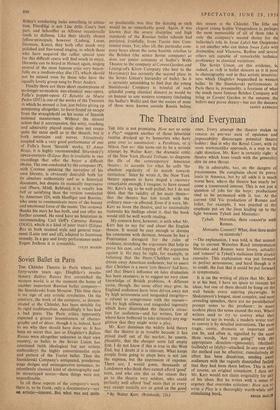The Theatre and Everyman
THE title is not promising. How not to write a Play* suggests another of those laborious facetite dredged up by humorists who have gone over to automation : a Perelman, or' a Mikes. Not so: this turns out to be a serious attempt by Walter Kerr, the dramatic critic of the New York Herald Tribune, to diagnose the ills of the contemporary American theatre: to account for what he calls 'the absolute regularity of its march towards extinction.' Since he wrote it, the New York theatre appears to have staged a recovery remarkable enough, I imagine, to have caused Mr. Kerr's leg to be well pulled; but I do not think that the validity of his main thesis— that the theatre has lost touch with the ordinary man—is affected. Even if it were, Mr. Kerr so loves the theatre, and so successfully transmits his feelings about it, that the book would still be well worth reading.
My concern here, however, is with what Mr. Kerr has to say for and about the English theatre. It would be easy enough to dismiss his comments with derision, because he has a Procrustean disregard for the rules of evidence, stretching the arguments that help to prove his case, and lopping off the arguments against it. He may be right, for example, in believing that the Ibsen /Chekhov axis has driven away American audiences; but to assert that Chekhov is a mere 'arts theatre' fad here, and that Ibsen's influence on later dramatists has been excessive; is to suggest no very close knowledge of British problems. A different cause, though, the same effect may give. In England audiences have been driven away not by high seriousness and misguided integrity— a refusal to compromise with the masses— but by high silliness and misguided ingenuity which have diminished the theatre's attrac- tion for audiences—and for writers, few of whom have bothered to take seriously any sug- gestion that they might write a play.
Mr. Kerr dismisses the widely held theory that the theatre is in trouble because it has priced itself out of the market; he asserts, plausibly, that the cheaper seats fall empty first. I do not know if this is true in the West End, but I doubt if it is relevant. What keeps people from going to plays here is not just the expense, but the impression of expense. There are, I would guess, thousands of Londoners who think they cannot afford 'good' scats, and who cite this as the reason they go to the theatre very seldom, who could perfectly well afford 'bad' seats that in every way except socially arc as good as the good ? By Walter Kerr. (Reinhardt. 21s.)
ones. Every attempt the theatre makes t• resume its pre-war aura of opulence an impeccability discourages potential theatr fodder : that is why the Royal Court, with it more workmanlike approach, is a step in th right direction. Mr. Kerr is certainly right: theatre which loses touch with the generality slits its own throat.
He is admirable, too, on the dangers of preciousness. He complains about its preva- lence in America, but by all odds it is much worse here, where the theatre has nearly be- come a transvestcd interest. This is not just a question of jobs for the boXs: productions tend to be permeated with it, too. At the current Old Vie production of Romeo and Juliet, for example, I was puzzled at the emphasis put on the lines leading up to the fight between Tybalt and Mercutio: Tybalt. Mercutio, thou consort's: with Romeo, Mercutio. Consort? What, dost thou make us minstrels?
—The explanation, I was told, is that accord- ing to current Waterloo Road interpretation Mercutio and Romeo were lovers, actually; and 'consort' is Tybalt's malicious little double entendre. This explanation was put forward in perfect seriousness; and hard though it is to credit, the fact that it could be put forward is symptomatic.
It is on the writing of plays that Mr. Kerr
is at his best. I have no space to recount his ideas; but one of them should be hung on the wall beside every aspiring playwright. In Shakespeare's longest, most complex, and most revealing speeches, there are no parenthetical prompt notes to the producer: in manY modern plays •the notes exceed the text. Where writers used to try to convey what theY wanted to say in words,'a modern writer tries to convey it by detailed instructions. The most tragic, comic, dramatic or important exit can be, and often is, signalled by the same three words, Are you going?' with the appropriate directive—(piteously), (thrilled). (sullenly) or (slyly)—attached. In any one plaY the method can be effective; cumulatively ifs effect has been disastrous, sending awaY audiences with the vaguely dissatisfied feeling that they had been there before. This is not, of course, an original complaint; I dare saY Mr. Kerr would not claim originality for any of his ideas. But he writes with a sense of urgency that overrides criticism : How not 10 write a Play is a thoroughly worth-while and


































 Previous page
Previous page